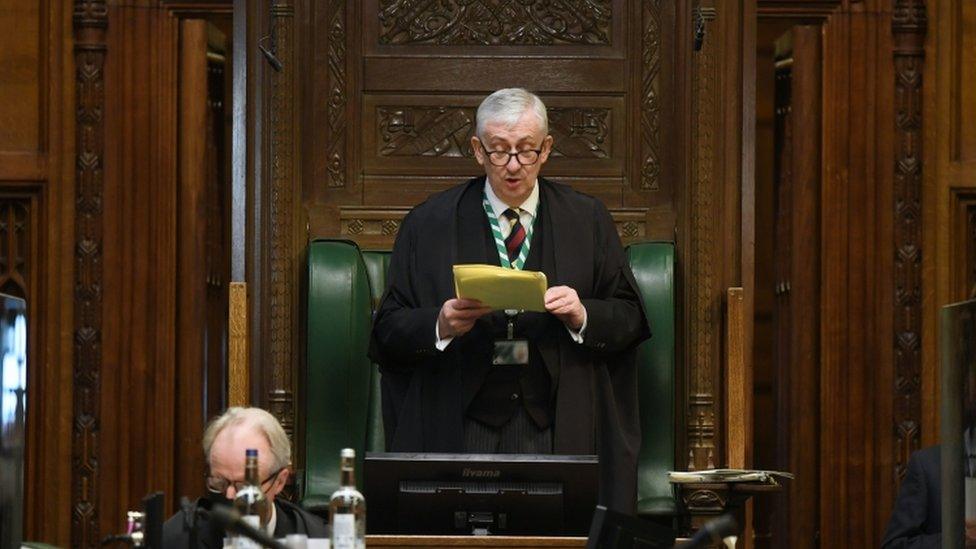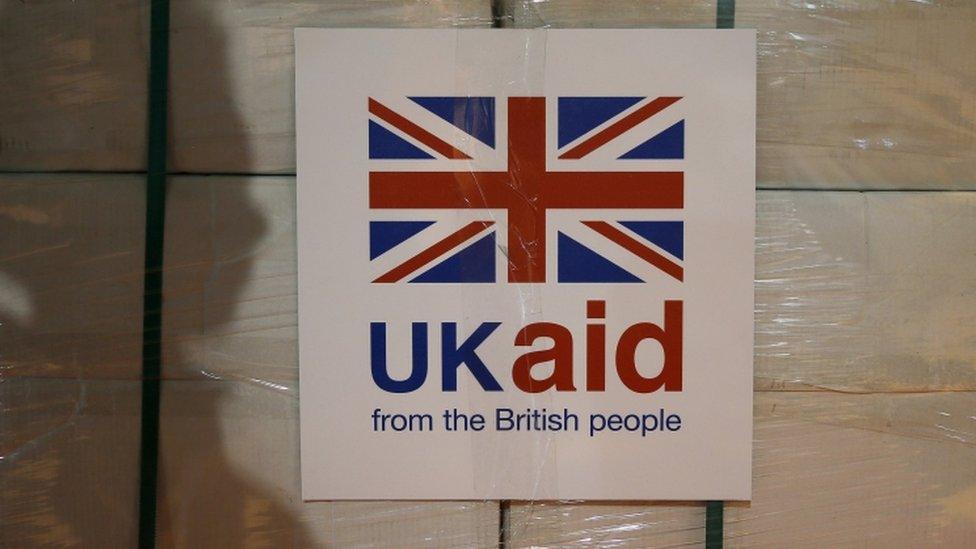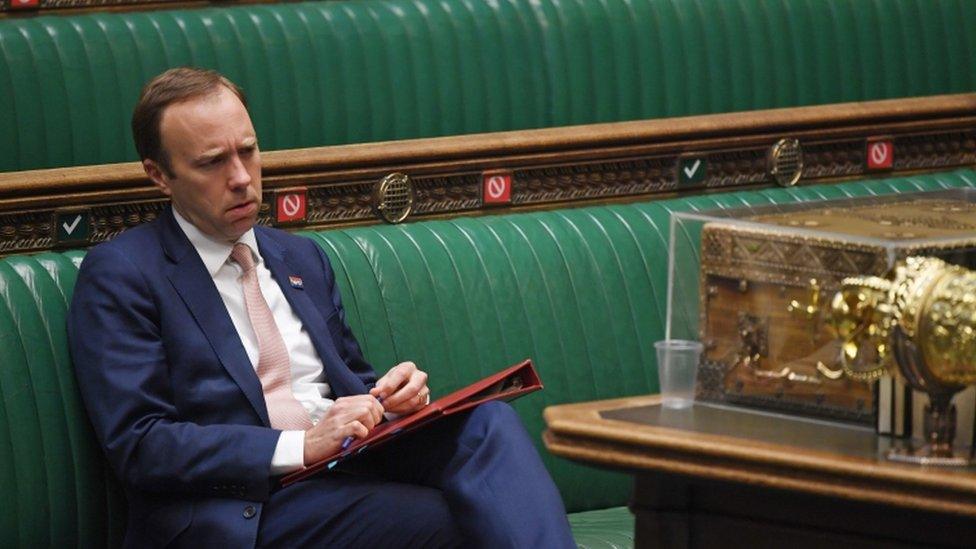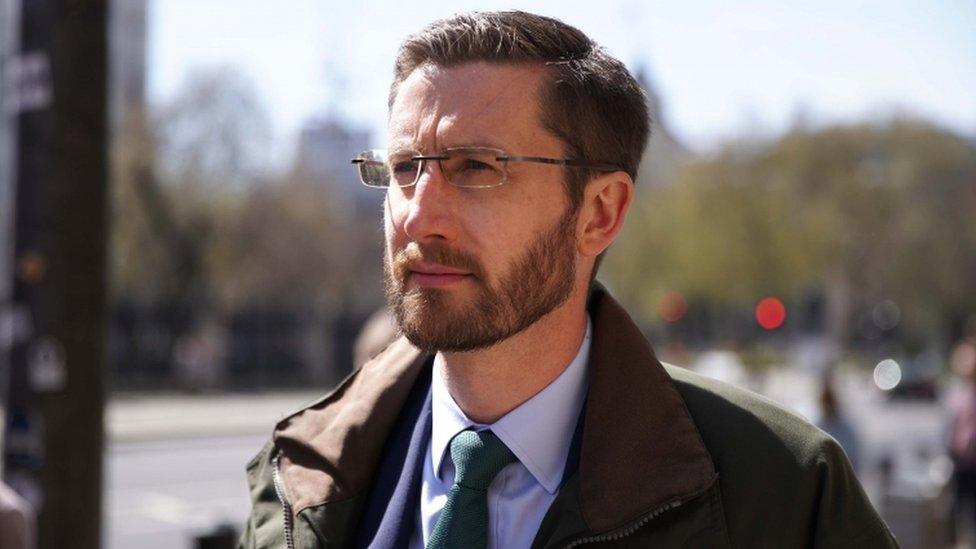The week ahead in Parliament
- Published

Parliament rose for its half term break the day after asteroid Dominic Cummings impacted on planet Westminster, leaving seven hours-worth of toxic allegations to reverberate back and forth.
Will the claims by the prime minister's former factotum prove to be an extinction level event for his former master or for Matt Hancock the Health Secretary? The week ahead provides a number of parliamentary occasions in which the claims can be explored - perhaps with added documentation. With big decisions looming on whether to loosen lockdown restrictions, the Cummings critique will be folded into the debate on the future handling of the pandemic.
Elsewhere, some of the other controversies of recent weeks re-emerge; William Wragg's Public Administration Committee is still gnawing away at the Greensill affair (Tuesday) and, deep in the Westminster interior, a Public Bill Committee is chomping its way through the detail of the controversial Police Crime Sentencing and Courts Bill, with its new restrictions on protests. It will be back in the Commons for report stage consideration in a few weeks. There will doubtless be a blizzard of amendments on all kinds of issues.
Then there's the growl of Conservative backbench angst over cuts to overseas aid. A well-organised group of backbench Tories have launched a surprise attack to reverse the government's cut to the international aid budget from 0.7% of Gross National Income (GNI), to 0.5%. That's a reduction of about £4bn. Ministers argued this was needed to repair the public finances after the pandemic.
The former prime minister, Theresa May, heads the list of 30 rebels backing an amendment that would reinstate the 0.7% of national income aid target from January 1 next year. The number of open supporters, 30, suggests that 45 or so Conservative votes needed to defeat the government could be within reach - but it only matters if the amendment is selected for debate by the Speaker on Monday.
Here's my rundown of the week ahead:
Monday 7th June

Expect fireworks as the Conservative Party disagrees on cutting overseas aid
The Commons reconvenes (14:30) with an hour of Home Office questions - doubtless to be followed by the usual clutch of post-break government statements and urgent questions.
Then, MPs polish off the report and third reading consideration of the Advanced Research and Invention Agency Bill - which sets up a new freewheeling research agency, modelled on the American DARPA (Defence Advanced Projects Research Agency), which would have much more freedom to fund projects which might be regarded as too speculative by the existing funding models. ARIA is the brainchild of the former advisor to the Prime Minister, Dominic Cummings.
This looked as if it would be a fairly straightforward exercise, until the Bill became an unlikely target for the powerful lobby of senior Conservatives pushing back against the government's cut to the international aid budget. Their amendment would insert a requirement that any shortfall from the target figure of 0.7% of UK GNI spent on Official Development Assistance (ODA) should be made up from the ARIA budget. On the face of it, it seems a bit of a stretch to consider this amendment "in scope" - within the purpose of the Bill, and it will need to be selected for debate by Mr Speaker.
But, look again. The amendment is proposed by the wily former chief whip, Andrew Mitchell (also a former international development secretary). During the Queen's Speech debate, Mr Mitchell orchestrated a series of calls for the 0.7% commitment to be restored, pointing out it was a manifesto promise. "With our economy returning to growth, there is no justification for balancing the books on the backs of the world's poor," he said at the time.
The amendment is backed by a series of heavyweight backbench worthies, including select committee chairs, Karen Bradley (Procedure), Tom Tugendhat (Foreign Affairs), Sarah Champion (International Development), Meg Hillier (Public Accounts), Tobias Ellwood (Defence) and Neil Parish (Environment, Food, and Rural Affairs), plus all-purpose backbench guerrillas David Davis and Sir Edward Leigh, former minister Harriett Baldwin and the Father of the House, Sir Peter Bottomley. The list of MPs elected in 2019 supporting it is thinner, although former special advisor Anthony Mangnall has signed up.
I run through this extensive list, because that's a serious tonnage of backbench opinion, and there may be more in reserve. Former PM Theresa May was added to the list of backers to keep up the pressure and keep the story moving. Others may follow, and the pressure could push ministers to commit to restore the 0.7%, rather than lose a vote.
Elsewhere there are Labour, SNP and Lib Dem amendments calling for the new research agency to focus on developing carbon neutral technologies.
In Westminster Hall (16:30) MPs debate three e-petitions linked to the Government's Action Plan for Animal Welfare - first (115,000 signatures) that the UK should ban the importation of Shark Fins, second (128,000 signatures) to ban the exploitative import of young puppies for sale in the UK and third (103,000 signatures) to stop the rising number of ear-cropped dogs in the UK.
Then, MPs turn to a petition which calls for the government to create a specific offence of abusing, threatening or assaulting a retail worker - backed by stiff penalties. The petition attracted 104,000 signatures, but the government is not persuaded that a specific offence is needed.
The day's Committee business includes Treasury (15:30) hearing from the British Retail Consortium, UK Hospitality and ABTA, the Travel Association, on the economic impact of the pandemic.
In the Lords (13:00) questions to ministers range across dual UK-Iranian citizens held in Iran, and arts education in secondary schools.
The main event is the second reading of the Environment Bill - as with the Domestic Abuse Bill this is the kind of measure that has strong cross party support, but peers will want to add all kinds of extra provisions Ministers will therefore be on the alert for statements of intent during this debate. Among the issues that might feature are the new domestic framework for environmental governance, as well as on specific environmental policy areas including waste, air quality, water, nature and biodiversity, and conservation covenants.
Backers of the proposed Climate and Ecological Emergency Bill, a measure campaign groups are seeking to push through parliament as a private members bill, mandating a tougher approach to carbon emissions and greenhouse gases, might try to build in some of its provisions. Watch this space.
Tuesday 8th June

Matt Hancock will face MPs in health questions at 11:30
The Commons opens (11:30) with health and social care questions, providing a further opportunity to follow up some of the Dominic Cummings claims with the Matt Hancock. Given that the day's law-making looks relatively uncontroversial, it may be that the Health Secretary also delivers one of his regular pandemic update statements.
The main legislative action is the second reading debate for the Compensation London Capital & Finance PLC and Fraud Compensation Fund Bill - this creates two separate compensation funds. The first is to meet the exceptional circumstances around the collapse of London Capital & Finance PLC, and is expected to pay out around £120 million to investors, with individual entitlements capped at £68,000, after a report into the supervision of the firm was strongly critical of the Financial Conduct Authority's actions.
The Bill will also extend the existing Fraud Compensation Fund for occupational pension schemes to cover victims of "pension liberation" schemes - where people have been persuaded to transfer their savings from legitimate schemes to fraudulent schemes with supposedly higher returns. The Bill gives ministers the power to make a loan to the Board of the Pension Protection Fund to cover the additional costs (which result from a High Court judgement) and the money will be repaid from an industry levy.
In Westminster Hall (16:50) my eye was caught by the Conservative Tim Loughton's debate on the future of the learned societies at Burlington House - whether an increase in the rent charged to bodies like the Society of Antiquaries might force them out of their long-standing HQ on Piccadilly, next to the Royal Society for the Arts.
The Greensill affair rumbles on, with the Public Administration Committee (09:30) taking evidence from another panel of key players, including the former cabinet office minister, Lord Maude, and Bill Crothers, the senior civil servant who took a job at Greensill Capital, while still on the government payroll.
Environment, Food and Rural Affairs (14:30) take evidence on how the Animal and Plant Health Agency and Border Force work together to oversee the movement of animals across British borders, and protect UK biosecurity.
Education looks at education in prisons (10:00) and Justice looks at mental health in prisons (14:30). Other Committee sessions include Business, Energy and Industrial Strategy (10:00), looking at how to move consumers to low carbon domestic heating systems.
In the Lords (12:00) there are questions on the treatment of vulnerable claimants for disability benefit, and the recovery of the visitor economy.
Then, peers consider an attempt by the Lib Dems to quash the Town and Country Planning (General Permitted Development etc.) (England) (Amendment) Order 2021 - this aims to make it easier to change the permitted use of buildings from business to residential and extends the development rights for schools, hospital , universities and prisons. The fatal motion from Baroness Pinnock complains that this amounts to a major policy change which has been introduced without proper scrutiny by Parliament. It is not backed by Labour, whose new Chief Whip, Lord Kennedy, has put down a regret motion instead.
Next come all stages of the Finance Bill, to be taken in a single gulp - this is the measure that enacts the changes made in the Budget and, because it is a money bill, it's out of bounds. Peers can do little more than register the odd moan if they don't like its contents. In this instance the moans will be about corporate tax breaks and equalising rates for digital businesses compared to traditional bricks and mortar firms. The debate will also range across the report from the Lords Economic Affairs Finance Bill Sub-Committee, entitled "New powers for HMRC: fair and proportionate?".
Wednesday 9th June

The Transport Committee will consider public charging points for electric cars
The Commons opens (11:30) with half an hour of questions to Alok Sharma, the President of the COP 26 Climate Change summit, followed by Prime Minister's Question Time at midday.
The day's main debate will be on a Labour Opposition Day motion, to be announced, but quite possibly at least one debate could be Cummings-related, perhaps on the level of protection for care homes, in the early phase of the pandemic.
On the committee corridor, Home Affairs (10:00) has two panels of witnesses on violence against women and girls, and Transport (09:30) has a session on zero emission vehicles and road pricing - with the focus on the lack of public charging points for electric vehicles. This is seen as one of the biggest barriers to switching from fossil fuels.
In the Lords (12:00) question time covers enabling people convicted under now abolished homosexual conduct offences to have their convictions disregarded, and reducing avoidable deaths from Sudden Adult Death Syndrome in the UK, in particular in sport.
Then the House moves on to the first of three days of Committee Stage scrutiny of the Professional Qualifications Bill. These debates are normally exploratory, with nothing pushed to a vote. The issues under the Lords' microscope will be how domestic skills shortages are identified and filled, consultation with regulators on Free Trade Agreements, and protection for people whose qualifications are already recognised and working in the UK.
Thursday 10th June

Cabinet Secretary Simon Case will be giving evidence on the government's response to Covid-19
MPs begin (09:30) with International Trade questions - about to become a rather livelier occasion, as more new trade deals appear. This will be followed by the weekly statement on the forthcoming Commons agenda, by Leader of the House Jacob Rees-Mogg.
The main debates are on subjects nominated by the Backbench Business Committee - first, a general debate on support for the aviation travel and tourism agencies, followed by a debate on World Press Freedom Day.
Committee meetings see a posse of the most senior figures in the Civil Service, headed by the Cabinet Secretary, Simon Case, before Public Accounts (10:00) to ponder the initial lessons from the response to Covid-19. This could, potentially, lead to more aftershocks following Dominic Cummings' revelations.
In the Lords (12:00), ministers face questions on youth justice statistics showing that more than half of all children in custody in 2020 were from a black, Asian or minority ethnic background, as well as financial support for UN peacekeeping operations.
The main debate will be on the report from the Food, Poverty, Health and the Environment Committee: "Hungry for change: fixing the failures in food", which calls on the government to ensure a healthy, sustainable diet is available to everyone. The report highlights the link between a poor diet and ill-health.
